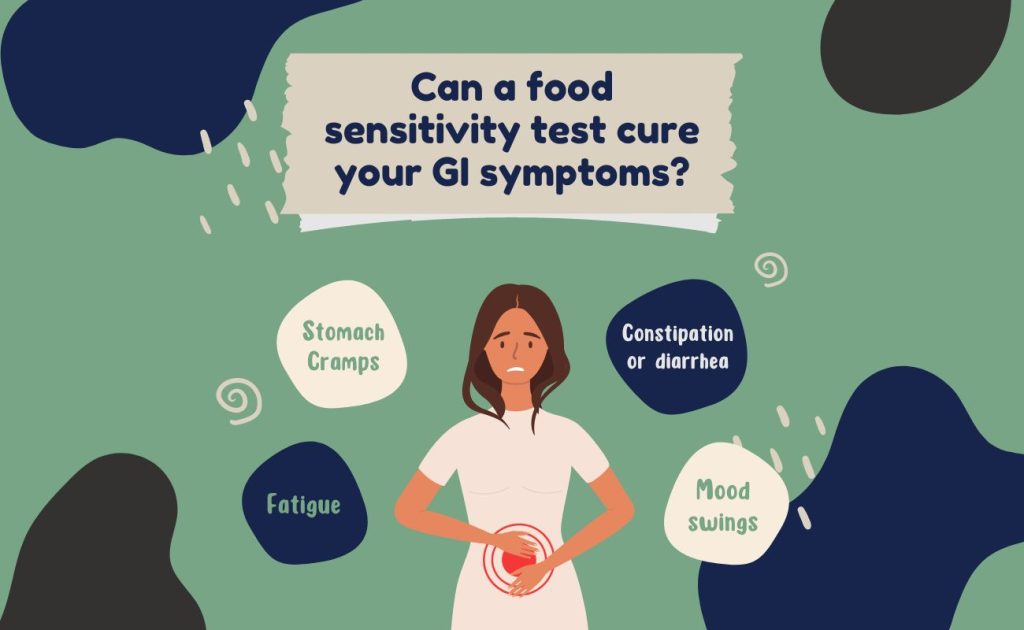
TLDR: For the majority of people, I don’t recommend food sensitivity tests.
One of the most popular tests for food “sensitivities” is ALCAT (Antigen Leukocyte Antibody Testing), which measures the swelling of blood cells when they’re exposed to the food in question.
I have not, in one single case, seen positive outcomes from following the recommendations from an ALCAT test. What I have seen is increased anxiety and stress surrounding food, which can make GI symptoms even worse.
A statement from the American Academy of Allergy Asthma and Immunology: “The use of these diagnostic tests or methods to diagnose allergies is unproven and can lead to inappropriate diagnosis and treatment.”
Same goes for LEAP testing and any other IGg or IGe antibody tests (such as EverlyWell).
EverlyWell (and many other similarly marketed at-home tests) test for something called IGg antibodies. They do test for the antibodies accurately but the problem is that the presence of IGg antibodies DOES NOT mean you have an allergy or intolerance. The body will develop IGg antibodies when exposed to a particular food, which just proves that it has been exposed (not that you will have a negative reaction). Many people will get test results that say they are intolerant to foods that they eat every day because those are the foods that they are most often exposed to.
What to do instead to help digestive issues
This is actually GOOD news. It means you save money AND you probably don’t have to cut out 100 foods out of your diet to improve your symptoms. The gold standard for figuring out which foods may be causing inflammation or GI symptoms is single elimination.
There is a list of top 8 allergen foods that we can start with, one by one, to determine what might be causing issues. But, for most clients, there are other things (outside of eliminating foods) that we can do to help with his stomach issues. It may not even be about eliminating certain foods at all. It could be more of a “rebuilding” approach, helping you to rebuild and rebalance your gut microbiome, introducing digestive enzymes, increasing the probiotics in the food you’re eating, working on stress relief methods, and teaching you how to put your body in rest and digest mode.
Top 8 Allergens
- Milk
- Eggs
- Fish
- Crustacean shellfish
- Tree nuts
- Peanuts
- Wheat
- Soy
Again, the gold standard for figuring out if you are sensitive/intolerant to a food is completely eliminating it from your diet. I recommend a minimum of four weeks to see if your symptoms clear up. You don’t want to eliminate ALL of these foods at once. Single elimination works best.
Caveat
Getting tested for celiac disease is different- that’s legit. That will show whether you are actually ALLERGIC to gluten (will not necessarily show “intolerance”). Celiac symptoms are usually severe and include diarrhea, pain, and inability to absorb nutrients.
Gut/Brain Connection
Whatever is happening in your brain (stress) can wreak havoc on your gut. I have had several clients who came to me for help figuring out what foods were causing their symptoms but it ended up not mattering at all what they ate and their symptoms were directly related to what else was happening that day or in their life at that time.
If you want help coming up with a personalized plan to help improve your digestive symptoms, book an appointment with one of our registered dietitians here.
Helping our clients restore their confidence in what they are eating is one of our favorite parts of the job. We know it’s not fun to not know whether something you’re going to eat is going to cause digestive issues, that’s why we love helping our clients figure this out. If you need help and you’re not already working with us, don’t hesitate to reach out.
